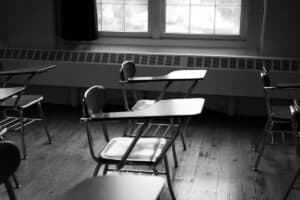The 2022 matric class was severely disrupted for two years, leaving many from impoverished backgrounds behind.

As many of them prepare to close their high school chapter, the class of 2022 that first set foot in classrooms 12 years ago faced unprecedented problems, with little or no help along the way.
Those from impoverished communities were confronted with the effects of the Covid-19 pandemic that altered the way they lived and learned, rolling blackouts, and catastrophic floods last year that destroyed their schools and the roads they used to travel on, especially in KwaZulu-Natal.
According to Equal Education (EE), a lot of emphasis is placed on matric outcomes while not taking into consideration the inequality and burdensome circumstances that affect pupils’ performance across school grades.
‘Massive blow’ for basic education
EE researcher Stacy Jacobs said many of the pupils were in schools that do not have adequate infrastructure, resources, or sufficient support.
ALSO READ: Matric Class of 2022: Basic Education minister lauds the country’s top matriculants
Their situation worsened while in Grade 10 in 2020, when the pandemic first hit.
“Face-to-face learning was disrupted when Covid first struck at a very crucial phase in their schooling. There was a need to adapt to virtual learning but unequal access is still there, so many of them missed out on classes, unlike others in resourced schools and in private education.
“That was a massive blow for the pupils in basic education. So they had to deal with many challenges, including the circumstances at home,” she said.
Trauma
Last year’s devastating floods in KwaZulu-Natal and the Eastern Cape further impacted pupils’ lives, after their schools were damaged and homes were swept away.
Frequent blackouts also disrupted teaching and learning, and likely deepened existing learning losses brought on by Covid-19.
Such was the traumatic experience that many pupils required psycho-social support, said Jacobs.
“They bore the brunt of so many systemic issues in our education sector. Having to deal with unprocessed and traumatic challenges had a bearing on them.
“Their families were affected, as many lost their homes, and many of the schools became inaccessible. Even though mobile classes were provided, some couldn’t make it to classes.
“Many learners rely on schools for a lot of services – such as the school nutrition programme. For some of them, that is their only meal, and suddenly, it was all gone in their matric year.”
READ MORE: Matric 2022 results: At least seven sets of twins among top achievers
Long periods away from the classroom and rotational school attendance for two consecutive years in Grade 10 and 11, led to this group losing at least three-quarters of a school year between 2020 and 2021 alone.
“These learners have undoubtedly had to work extremely hard to overcome severe learning gaps and have had to catch up on large parts of the curriculum to make it to this point,” Jacobs said.
The organisation said it will continue to call for the following:
- National department and provinces to fulfil their legal obligations in terms of the Norms and Standards for Public School Infrastructure.
- Investment in and strengthening foundation phase learning, as a schooling system built on a broken foundation cannot survive.
- Provision of proactive retention support to all pupils throughout their schooling so that they are able to fully participate in their learning experience in conducive environments, especially for vulnerable learners attending under-resourced schools.
- That government prioritise basic education and reflect such in national and provincial Treasury departments to increase funding, build and upgrade more school infrastructure.
Lauded for ‘overcoming Covid, load shedding’
Addressing the country’s best-performing matriculants in Johannesburg on Thursday, Basic Education Minister Angie Motshekga praised them, their teachers, and parents for overcoming the pandemic.
“This is a unique group in many ways. They went through curriculum assessments, and were the first group that went through Grade R when we introduced that in schools.
“They demonstrated a high level of resilience because they faced the Covid storm. I honestly thought about the two years of disruptions and having lost teaching time and doubts about you making it.
“It’s an honour to rub shoulders with the greatest and the best of our country. You are part of more than 12 million learners in the system, you made up for the loss and stood firm against adversity,” said Motshekga.
The department will release the results on Friday.
NOW READ: IEB matric class of 2022 maintains its 98% and above pass rate






